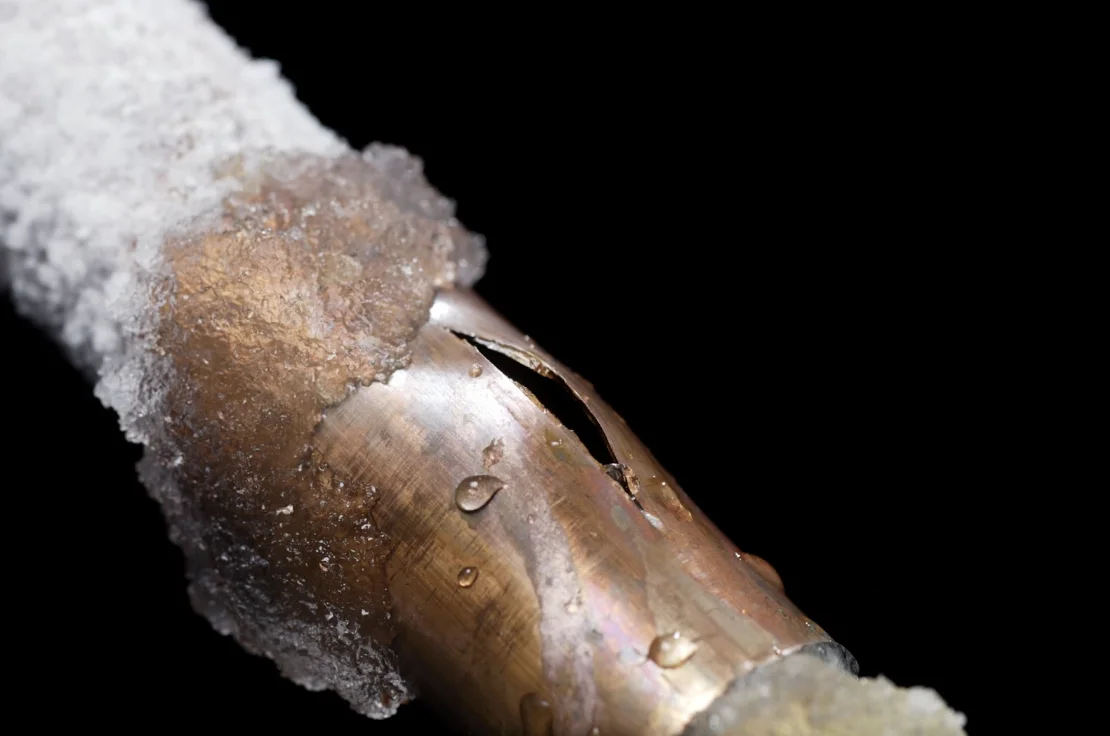Are you getting ready for vacation? Remember your home! Frozen pipes can be a big headache, causing water damage and ruining your holiday. Here’s how you can prevent this from happening so you can relax and enjoy your time away.
Pre-Vacation Preparations
A. Thermostat Settings
Keep your thermostat set to at least 55 degrees Fahrenheit (12 degrees Celsius) to protect your home from frozen pipes. This temperature helps maintain warmth inside the walls where pipes typically run, preventing them from freezing. Before you depart, remember to check and replace the thermostat’s battery if necessary.
B. Enlist Help
It’s a good idea to ask a friend or neighbor to visit your house each day you’re gone. They can make sure everything is warm enough and working properly, especially if it gets cold unexpectedly or your heating system isn’t reliable.
C. Water System Management
You might want to turn off your home’s water supply and drain the pipes to be extra safe. This means there won’t be any water left in the pipes to freeze. But remember, if your house has a fire sprinkler system, turning off the water might disable this important safety feature. If you need help or are unsure what to do, talk to a professional about keeping your home safe from fires and frozen pipes.
What to Do If Pipes Freeze
A. Immediate Actions
Sometimes, even with precautions, pipes can freeze. If you turn on your taps and no water comes out, open them and call a plumber immediately. This helps release any built-up pressure and prevent the pipes from bursting.
B. Safe Thawing Practices
If you find a frozen pipe, never try to thaw it with a flame, like a torch. This is very dangerous and could start a fire. A safer way is to use a hair dryer. Start at the faucet end of the pipe and slowly move towards the colder parts. Be sure you’re not standing in water or near anything that can catch fire while you do this.
C. Water Supply Management
If your pipes start leaking or burst, immediately turn off the water at the main shut-off valve. Please ensure everyone in your family knows where this valve is and how to use it. After turning off the water, open your taps to let out any remaining water and relieve pressure.
Preventive Measures and Energy-Saving Tips
Along with the steps above, think about how you can use less energy in winter. This not only saves money but also helps your heating system work better, which keeps your home warmer and reduces the risk of frozen pipes. You should add insulation to your pipes, seal up drafts around doors and windows, and use a programmable thermostat to efficiently manage your home’s temperature.
Final Thoughts
A little preparation before your vacation can go a long way in preventing frozen pipes. You can have a worry-free holiday by setting your thermostat right, having someone check on your home, managing your water system wisely, and knowing what to do if pipes freeze. Use these tips to keep your home safe and warm while you’re away.
FAQs
Are there specific areas in a house that are more prone to having frozen pipes?
Yes, pipes located in unheated interior spaces such as basements, attics, garages, and kitchen cabinets are more susceptible to freezing. Pipes running through exterior walls can also be at risk. Adding insulation to these areas and to the pipes themselves can help reduce the risk.
How long does it take for pipes to freeze and potentially burst?
Pipes can freeze in as little as six to eight hours of exposure to extremely cold temperatures. This means it’s crucial to keep your home adequately heated or pipes properly insulated, especially if temperatures drop significantly while you’re away.
What should I do if I return home to find the pipes have frozen but haven’t burst yet?
If you discover that pipes are frozen but not yet burst, start by opening cabinet doors to increase air circulation around the pipes. Then, gently warm the frozen section with a hair dryer, starting close to the faucet and slowly moving towards the colder sections of the pipe. Never use an open flame, and keep checking for leaks as the pipes thaw.
Can I use heat tape or a heat cable to prevent pipes from freezing?
Yes, heat tape or heat cables are good solutions for pipes that are prone to freezing. These products are designed to be wrapped around pipes to provide consistent warmth. It’s important to follow the manufacturer’s installation instructions closely to ensure safety and effectiveness.
Get the right coverage for your home with tutenagency
New tutenagency customers?
Quote homeowners insurance online or call (334) 502-5111 to insure your home.
Legal Disclaimer: ADVERTISING MATERIAL ONLY. Do not rely on this site or this article for legal or financial advice. The information provided on 210agency.com is strictly for educational purposes and to provide you with general educational information. Since state laws and financial regulations are subject to change, please schedule an appointment with an attorney or qualified financial advisor in your area to further discuss your personal situation. This public information is neither intended to, nor will it, create an attorney-client or financial representative relationship.

